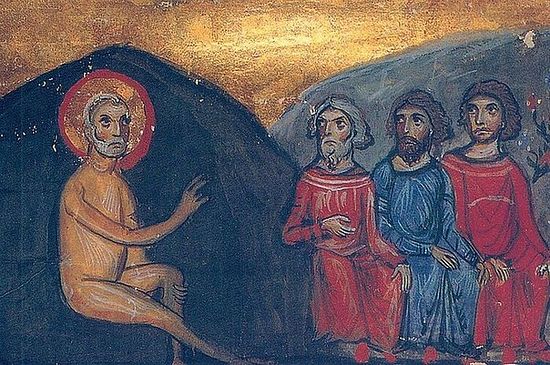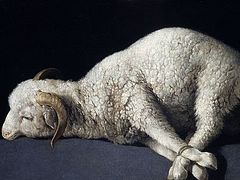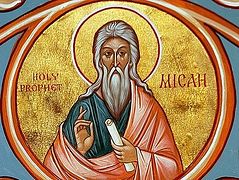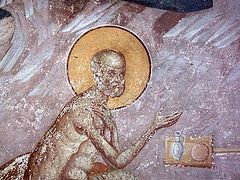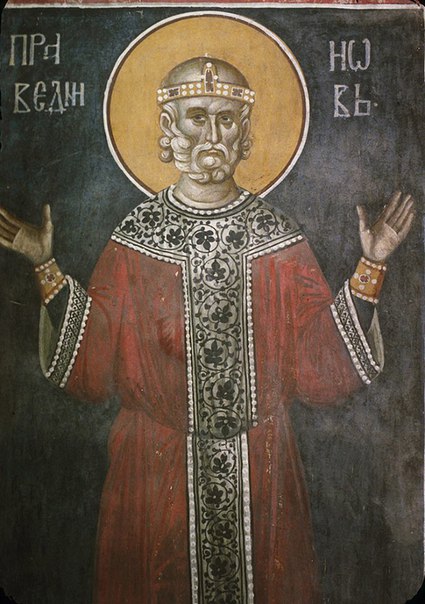
The Lord Jesus Christ is the one true example of what God calls man to be. The Lord is the Father's Great High Priest, Prophet like unto Moses, and King of Kings. He is all of these by nature of Who He is. Throughout the history recorded in the Old Testament various men had risen to these positions as called by God. Prior to the establishment of the Law under Moses there was one man who served as a prototype of God's great Priest, Prophet, and King, known for the agonizing trial he had to endure at the hands of the devil, and the ill advice of family and friends. He, who "before grace, and before the Old Testament, endured this most grievous war so nobly!"[1] is the holy Forefather Job.
Prior to the Law given on Sinai, Job shows that man can cleanse the inner man. Christ says that Moses allowed concessions for the hardness of the heart (in this case divorce), but from the beginning it was not so (Mt. 19:8). The Pharisees, who claimed to know the Scriptures, should have known that the Law was never the highest calling by God. Even more to the point is that Job was never a member of God's covenanted community. He was a descendent of Abraham but not through his son Isaac. He was not a child of the promise, and yet by nature, even without the Law he shows how all of mankind ought to be in relation to the Creator: when Gentiles, who do not have the law, by nature do the things in the law, these, although not having the law, are a law to themselves (Rom. 2:14). In not having the Law in stone, Job shows that he follows God's Law in its intent.
This intent of the Law was to make the children of Israel into a kingdom of priests and a holy nation (Exodus 19:6) which is also the intent of the Church.[2] From the beginning, man was called to be God's Prophet, Priest, and King over creation. That was always to be his ministry even had the Fall never happened. Job showed that he was God's priest through his prayers and intercessions for those around him. He showed his role as prophet of God by preaching God's word to those who were in error—that is, his wife and friends. Finally, he showed forth God's ideal of the king by never allowing the material possessions that he had, or did not have, to rule over him. Before any covenanted community existed Job already showed man's high calling.
Job as Priest
The first calling of the holy forefather is that of the priest. Foremost of all of his callings, man was created to be a priest. Man is in the image of the Son, Who is the Great High Priest. Creation is given as a gift and offered to man, and man is called to take all of what he is given and offer it back to God.
When man refused this high calling, rebelled, and fell away from God, his ability to perform this function was darkened. The Law was given to prepare the Jewish people for the Messiah when the relationship could be reestablished and man could once again function as a priest. That God's priests do not simply pardon external sins, but moreover cleanse the inner man, is shown in Job. Even after receiving the shocking news that he had lost all, his first act was to turn to prayer: neither crying nor groaning, but turning to God in prayer and giving Him thanks.
At the beginning of the book Job is making intercessory prayers on behalf of his children while they party. They have committed no known sins as of yet, but all the same Job is petitioning God for the spiritual state of his sons and daughters. He purified his children and offered sacrifices for their number, as well as one calf for the sins of their souls (Job 1:5). While he did not have the grace of Pentecost available in the Church, Job does show what the Pharisees and Scribes missed.
Job's priestly role is shown again at the end of the book when his friends must repent of their accusations of him. They come to him for the offering and the Lord God tells them that Job will make the intercessory prayers for them. Because of Job's mediation God spares his three friends. God would have even destroyed the three for Job's sake because of their false witness, but did not because of Job's prayers.[3]
When God rebuked Job’s friends He told them that it was only Job's prayers that could restore them. St. John Chrysostom comments on the power of Job's prayers for his friends, as it was only their accusations that truly cut at his heart. The saint writes:
And Job again, all adamant as he was, and firmer than a rock; when he had been robbed of all his possessions, and was suffering those incurable ills, and had become on a sudden childless, and when his body was pouring out worms like a fountain, and his wife attacking him, he repelled it all with ease; but when he saw his friends trampling upon him … then there was trouble, then commotion, even in that great and noble-hearted man.[4]
Job both makes the offering for sins and intercedes on behalf of the sinner. Not only are all restored, but the blessings are in abundance. God forgives all of Job's losses when he prayed for his friends (Job 42:10). As a priest, Job demonstrates that it is communion with God that must happen before God grants any material gain. The welfare of his friends in God's sight was more important than Job regaining what he had lost. Job once again shows that the priesthood of God is not simply seeking restitution for wrongs against the Lord, but that the soul and inner life must also be made whole.
The power of his intercessions is recounted in Ezekiel when God speaks concerning His wrath for those who turn from Him. The famine and death would be so extreme that if Noah, Daniel, and Job were present they could deliver only themselves by their righteousness (Ezek. 14:14, 20). Elsewhere, St. John Chrysostom says that his virtue and the power of his prayers were so great "that the very theatre of angels shouted at beholding his fortitude of soul, and applauded him."[5]
The priestly role of Job also shows that the main quality that allows someone to be a priest is one's closeness to God—not just anyone for any reason can function in that role. The priest must be a man of prayer and faithful to the Lord, not only when life is easy. The enemy attacked the first priest with words and flattery, but attacked Job with deeds and physical affliction.[6]
Unlike his friends who fell into pride and haughtiness, Job never breaks his communion with or trust in God. He remains always in God. Because he never lost that communion he is able to successfully offer prayers at the end and thus he is blessed. The priest of God, even before the sons of Levi’s entry into the Promised Land, is to always maintain dialogue with God.
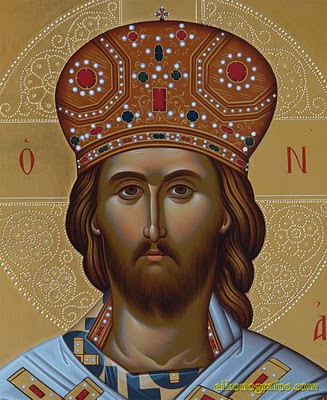 Christ the High Priest
Christ the High Priest Job as Prophet
From the beginning man has also been called to be a prophet of God. The prophet is not only one who predicts the future or can see into the past, but the prophet speaks God's word to others. The prophet is sent by God to preach to His people. The book of Job tackles the question of why bad things happen to good people. Job as the prophet of God answers that it does not matter so much as man's disposition towards God, and that virtue must be practiced already long before the calamity: "Unless he had practiced freedom from all despondency, he would have uttered some rash word."[7]
Job begins with many blessings of both material wealth and many children. Before all is taken away he praises God and remains faithful. In the eyes of the world this is to be expected. It is when all of Job's prestige and even his health are taken away that his true role as a prophet is revealed. Despite his loss of everything—his money, his flocks, his children, and his health—he nevertheless remains faithful to God. He neither assumed a wrong he did not commit, nor did he curse God. "In both wealth and poverty he utters the same thing: 'Blessed be the Name of the Lord, from this time forth and forever more.'"[8]
Christ remains wholly faithful to His Father during the trial of His Passion, from His weeping in Gethsemane to His silence during His trial and execution. Job also remains faithful to God while sitting alone and diseased with nothing to his name. His great act of prophecy is remaining faithful during his trial. When God seems distant and merciless, he who remains lawfully steadfast through the experience will realize the grace that is there.[9]
So Job, being a prototype of Christ, speaks the word of God by neither blaming God nor himself for what happened to him. Christ was mocked by both the Jews and Gentiles, and Job was mocked by his friends. Christ was tested to end it all by the Chief Priests, and Job was told to curse God and die by his wife. "If we grasp the judgment of the Son of God, we shall always be humble, strong, and well pleasing to Him."[10] Like all prophets of the Lord, Job was able to follow His judgment. Following the Almighty's Will, Job as the prophet of God shows through his endurance the end intended by the Lord—that the Lord is very compassionate and merciful (Js. 5:11). The message of the prophet, even before Israel's foundation, is that of God's love and mercy to those who reciprocate that love.
Job as King
Lastly, Job is shown to be an image of God's ideal king. He was a man of great material wealth and power, having much livestock and his works were great on the earth, and [he] was the most noble of men of the East (Job 1:3). Additionally, when he is struck by Satan, the friends who come to him—Eliphaz the Temanite, Bildad the Shuhite, and Zophar the Naanathite—are also rulers or men of power.[11] Job was a man of great means in the eyes of the world.
His friends cannot believe that someone righteous could lose so much and accuse him of committing some unknown sin of which he must repent. Job, however, shows that God's view of the king is the one who is not attached to material goods or temporal blessings. He tells his wife that if he received the good from God, should he not also endure the evil?[12] St. Clement of Rome also notes that Job is one of the many who follow in Christ's noble humility, being counted righteous by God, yet accounting for his fallenness.[13]
The true king of God is one who realizes that all of creation is God's gift to man, and in the fallen state of humanity even the evil should be accepted as from God—not created by Him but allowed by Him for humanity's ultimate good. We do not look to material things because the kingdom we are called to be in is not of this world.[14] St. John Chrysostom comments that Job "was rich, but he served not mammon, but possessed it and ruled over it."[15]
Job shows himself to be that ancient king of God whose focus is not on what he has or what is taken from him, but rather his relationship with God. Christ is the King of Kings and Lord of Lords, and yet came to earth as a simple man of a rural town. For the Orthodox, that image of Christ in humility and nobility is true kingship. Even when He is abandoned at His Passion He fulfills the Divine Will of the Father. Job also, when being rebuked by all and seated upon a dung heap stricken with boils, maintains total faith in God. Because he was "able to bear much wealth with moderation, much more will he be able to bear poverty with manliness."[16]
This total faith allows Job to allow God to rule and reign in him, which is the kingship we possessed in the Garden of Eden prior to the Fall. This communion with the Creator is what allowed Adam and Eve to name and rule over the animals. This high rank in the created order is what was ultimately restored for man in Christ. Job was an early prototype that shows this kingship in never losing his nobility despite his trial. Job proves that the true Kingdom of God is within all of us.[17] Because this Kingdom exists within and is with God, the true treasure and wealth cannot be measured or quantified. Job never lost sight of from where comes true abundance for a king: from the hand of God.
Conclusion
Man has three callings from God: those of His priest, His prophet, and His king. While the Incarnation of the Lord gives us the perfect example of these callings, long before Christ's birth there were prototypes pointing towards His coming. Many such were found within the covenanted community of ancient Israel. One, however, stands out as being outside the covenant: the Forefather Job. He is descended fifth from Abraham though not of the line of the promise. Despite this, he is counted righteous and blameless by God. He serves as the true priest of God by making offerings and intercessions for his children and friends. He functions as God's prophet by standing steadfast amidst his trial and preaching the truth of God to his wife and friends. Lastly, he functions as God's king, who realizes that his true riches and wealth are not to be found in material things. He neither loses his noble character from having wealth, nor becomes vengeful when stricken with poverty.
In fulfilling these ministries Job shows that the common thread in being God's priest, prophet, and king is to always maintain communion with Him, and that in doing so man fulfills his God-given role and responsibility before his Creator. It is communion with God that was lost at the Fall and is restored in the Church, although, despite their fallenness, there were ancient forefathers who always yearned for such a relationship with God, such as Seth, Enoch, Noah and Abraham, counted as righteous before the promise to the Jewish people. Job is unique in that he is blameless although a Gentile. He was "one who worshipped God only; unfettered by Judaical observances, yet exhibiting all manner of wisdom and piety."[18]
Job's inclusion in the Hebrew Scriptures shows that God's intentions are for all men. The people of the Abrahamic Covenant were called for a specific purpose to bless the world, but Job's holiness before the Law shows what anyone can do when he seeks the Lord, showing a glimmer of what God intends for man, and what everyone can now experience in the Church. Job points the reader to this high calling which is lived in the Lord's Holy Church, the royal nation of all of God's priests, prophets, and kings. Job so exceeds in holiness that "in many other places too one might find this name standing in for virtue in general."[19]
What we can learn from such an Old Testamental life is to never cease desiring communion with the God Who is Life. If Job, who had neither the Law nor the grace of the Spirit within the Church, could endure such a horrid trial, how much more are we given to endure the onslaught of the devil and his demons? If we remain steadfast in our faith in God no matter what comes our way, we will all be God's priests, prophets, and kings—we will all be like Job.

